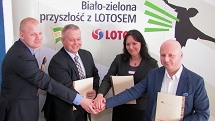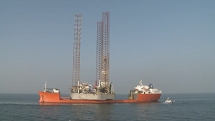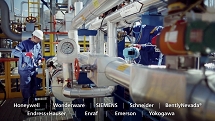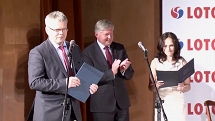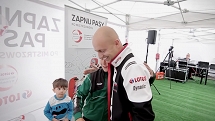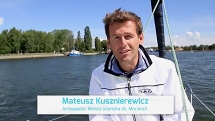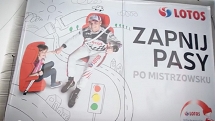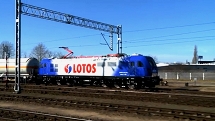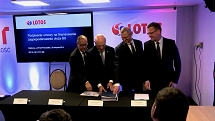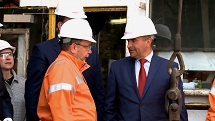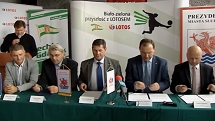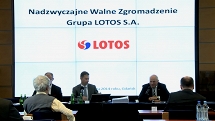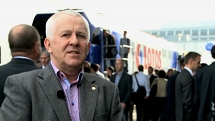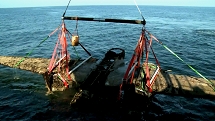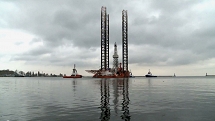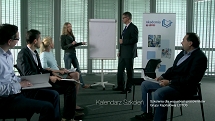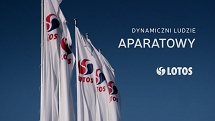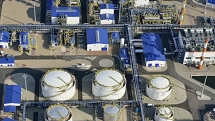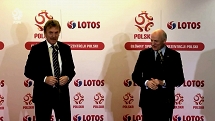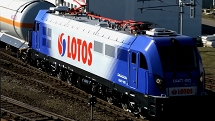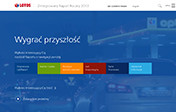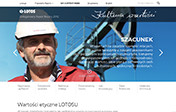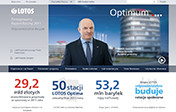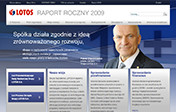-
Financial information
The past year ushered in a series of challenges for the companies in the fuel sector. The decisions made by us have demonstrated that we are able to take rapid steps to adapt to a demanding environment and ensure the desired profitability for our projects.
-
Segment performance
The segmental management model we have implemented enhances management efficiency, delivering cost and revenue synergies across the organization.
-
Letter from the Vice-President of the Board
2014 ushered in a series of challenges for the companies in the fuel sector. The decisions made by the LOTOS Group have demonstrated that we are able to take rapid steps to adapt to a demanding environment and ensure the desired profitability for our projects.
-
Business environment
The key factor that had a strong impact on both the global and Polish petroleum markets in 2014, with significant consequences for the LOTOS Group’s performance, was the price of crude oil, which also determined the price of petroleum products.
-
Strategic objectives
The LOTOS Group’s Strategy is designed to strengthen our position as a strong, innovative and efficient business which plays a major role in ensuring national energy security.
-
Business model
Our operations consist in crude oil production and processing, as well as wholesale and retail sale of petroleum products, among which are: fuels (unleaded gasoline, diesel oil and light fuel oil), heavy fuel oil, bitumens, aviation fuel, naphtha, propane-butane LPG and base oils.
-
Risk and opportunities
At the LOTOS Group, we identify a range of diverse risks, which may affect all areas of our business. The key risks in terms of their impact on our operations are the financial risks as well as risks affecting the exploration and production area. In the analysis of the risks, we also factor in issues related to sustainable development.
-
Key data 2014
With revenue of ca. PLN 28.5bn in 2014, we rank fourth in the group of 500 largest businesses in Poland.

Business model
The LOTOS Group operates in the upstream and downstream segments. The downstream segment comprises production and processing of refined petroleum products and their wholesale and retail sale, as well as auxiliary, transport and service activities. Key markets for refined petroleum products include Poland and countries in Western and Northern Europe, such as Germany, the Netherlands, Belgium, Sweden, United Kingdom, France, Estonia, Denmark and the Czech Republic.
The upstream segment comprises activities related to the exploration for and acquisition of crude oil and natural gas reserves, and crude oil and natural gas production and sale. Crude oil production is concentrated in Poland and Lithuania. All the natural gas produced is flared or sold to LOTOS Group companies. Natural gas produced in Norway is marketed to the United Kingdom and Continental Europe, with the entire condensate volume exported to the UK.
Crude oil and natural gas exploration and production
Through LOTOS Petrobaltic and its subsidiaries and jointly-controlled entities operating in Poland, the LOTOS Group held at the end of 2014 eleven licences for exploration or exploration and appraisal of hydrocarbons and hydrocarbon production from Baltic Sea deposits, with a total area of over 7.3 thousand km2. At the same time, Grupa LOTOS is the only oil company producing hydrocarbons in the Polish exclusive economic zone of the Baltic Sea. Consequently, the LOTOS Group has exclusive rights to carry out exploration and production work in this area. Long experience in exploration and production activities in the Baltic, progress of the LOTOS Group’s work in this area and the know-how about the methods, conditions and economic viability of exploration and production in the Polish exclusive economic zone of the Baltic Sea, paired with extensive technical resources, including own drilling rigs, offer an important edge over prospective competitors.
In addition, following the acquisition of Heimdal assets in 2013, the LOTOS Group acquired interests in 14 exploration and production licences through LOTOS Exploration and Production Norge AS and gained direct access to one of the key gas hubs on the Norwegian Continental Shelf, which is also one of the strategic areas for export of natural gas from Norway to Western Europe and the United Kingdom and accounts for some 15-20% of Norwegian natural gas exports. The acquisition of Heimdal assets allowed Grupa LOTOS to materially diversify its production assets, secured its ability to carry out exploration and production work in the promising and hydrocarbon-rich part of the Norwegian Continental Shelf, and increased its raw materials base and supply diversification options. They also contributed to the increase in crude oil and natural gas production in 2014.
Refining
The LOTOS Group operates one of the most advanced and youngest refineries in Europe.
Its plant in Gdańsk is a fuel and oil refinery integrated with bitumen production units, delivering a wide variety of products, including liquefied gases, petrochemical feedstock gasoline, unleaded motor gasolines, reformate, xylens, jet fuel, diesel oils, fuel oils, bitumens, base oils, paraffin products, plasticisers and sulfur.
The refinery has an annual processing capacity of approximately 10.5 million tonnes of crude oil and is one of the youngest and most advanced refineries in Europe. This has been confirmed by a number of distinctions: the World Refining Association named it the CEE Refinery of the Year in 2008, and in the Solomon Associates’ ranking comparing the energy efficiency of refineries all over the world it was recognised as the most energy efficient refinery in Central and Southern Europe in 2012. Moreover, in 2013 the Company won the award of the World Refining Association for “outstanding contribution to the industry”, granted based on the data on its performance, growth and market reputation.
The Gdańsk refinery also records a high distillate rate, i.e. a large share of fuels in the product mix, and focuses on medium distillates, which enables the Company to successfully adjust its output to the domestic demand structure and exports opportunities. The technological configuration of the refinery combined with its favourable location enable Grupa LOTOS to flexibly and efficiently process various types of crude, and thus vary the production volumes for particular finished product groups in line with changes in the domestic demand structure and export opportunities.
The refinery’s location on the coast of the Baltic Sea is a strategic advantage given the proximity of and the direct pipeline connection with the handling infrastructure of Port Północny (a part of the Gdańsk Seaport located on the Gdańsk Bay), and gives the Company a major competitive edge in the region in terms of logistics (access to feedstock and product sales channels). The location close to the handling terminal gives Grupa LOTOS direct access to international markets, enabling it to export its petroleum products primarily to Scandinavia, north-western Europe and Baltic states. It also supports optimisation of sales channels and efficient purchases of various types of crude oil and various petroleum products used by the refinery to manufacture finished goods.
The refinery also benefits from a unique combination of supply channels, guaranteeing it simultaneous access to feedstock supplies by road (from Russia) and via PERN’s pipeline network, as well as by sea, from numerous countries and the LOTOS Group’s own fields. With access to two supply channels, the Company is able to use different supply sources and respond flexibly to changes in petroleum product and crude oil prices, and can effectively diversify the types of crude processed at the refinery. Maintaining two crude oil supply channels ensures stability of feedstock supplies at Grupa LOTOS. In particular, the Company can substitute the entire volume of onshore supplies with crude shipped by sea.
In 2014, the Company completed a project at the refinery consisting in construction of an unloading terminal for crude oil and other heavy hydrocarbon raw materials to enable their transport to the refinery by rail tank cars. Thanks to this investment, Grupa LOTOS will be able to further diversify its raw material supply sources, including in the event of availability of oil from unconventional sources or other raw materials which can be transported only by rail.
Products
Key groups of products offered by the LOTOS Group and obtained from crude oil processing at the refinery are fuels (unleaded gasoline, diesel oil and light fuel oil), heavy fuel oil, bitumens, aviation fuel, naphtha, propane-butane LPG and base oils.
| Products |
|---|
| Unleaded gasoline is used in spark-ignition engines. Our unleaded gasolines include premium gasoline – LOTOS DYNAMIC 98, containing antioxidants and washing additives which support better cleaning of the engine, lengthen its useful life and economise fuel consumption. The fuel is dedicated solely to LOTOS service stations. |
| Diesel oil is used in compression-ignition engines. This product group includes premium diesel oil – LOTOS DYNAMIC DIESEL, which, owing to the use of friction-reducing components, offers more power efficiency of the engine and guarantees start-up at -32°C. The fuel is dedicated solely to LOTOS service stations. |
| Light fuel oil is designed for use in heating equipment. With a low sulfur content and unique additives, the product shows great performance in terms of oxidation resistance, anti-corrosive action, maintaining cleanness of nozzles, and reduction of emissions of noxious combustion products. |
| LPG – mixture of liquefied hydrocarbons, consisting primary of propane and butane. With both gasses mixed in correct proportions, the LPG can offer optimum working parameters. |
| Heavy fuel oil may be used for three purposes: as fuel for power generation, bunker fuel, and feedstock for further processing, including in coking units. |
| In the bitumens product group, the key product is road bitumen used in construction and maintenance of roads, airports and other hard surfaces. Apart from the road construction industry, bitumens are also used in the manufacturing of construction materials with waterproofing properties, with industrial bitumens being the most popular component. |
| Aviation fuel is designed for use in jet engines. |
| Naphtha is used as a raw material in the petrochemical industry and in production of motor gasolines. The entire naphtha output is exported. |
|
Base oils − the key products include Group I base oils, which are used as feedstock in the production of lubricating oils, including motor and industrial oils.
The primary motor oil product lines include: LOTOS Quazar – premium synthetic oils for cars (distributed only in authorised service centres), LOTOS Thermal Control – mineral, semisynthetic and synthetic oils dedicated for cars, and LOTOS Turdus – mineral, semisynthetic and synthetic oils dedicated for HGVs.
The key product lines of industrial oils are Hydromil, Transmil and Remiz, which make up a full category of hydraulic, turbine and machine oils, as well as industrial lubricants. |
Important new additions to the Grupa LOTOS product portfolio include xylenes and Group II base oils, introduced in 2012 and 2013, respectively. Xylene serves as feedstock for the production of polyesters which are used in the manufacture of plastics, including popular PET packaging and textile products. It is also used in the production of solvents for the paint and varnish industry. Group II base oils are used as feedstock for the production of high-quality lubricant oils. Group II base oils have sulfur content of less than 0.03%, viscosity index of 80-120 and saturator content of more than 90%.
Sales and logistics
Grupa LOTOS sells fuels and other petroleum products directly and through its subsidiaries.
Fuel sales are handled by Grupa LOTOS and LOTOS Paliwa (unleaded gasoline, diesel oil and light fuel oil). Fuels are sold by the Company on the domestic and international markets. Key customers in Poland include multinational fuel companies such as Shell, Statoil and BP, whereas internationally the Company supplies fuels to global trading companies and integrated fuel companies. LOTOS Paliwa operates solely on the domestic market, and its main customers include Polish fuel companies and LOTOS service station chain.
Sale of other petroleum products is carried out by the Company and its subsidiaries LOTOS Oil, LOTOS Asfalt and LOTOS-Air BP Polska. The Company offers heavy fuel oil, aviation fuel, naphta and base oils, selling the products internationally, for instance to global trading companies. LOTOS Oil sells lubricating oils in Poland and abroad, chiefly through distributors and authorised customer service points. LOTOS Asfalt offers road bitumens to customers in Poland and abroad, mostly construction companies. LOTOS-Air BP focuses on domestic aviation fuel sales to airlines (‘into plane’ segment), but also operates on the Polish wholesale market for aviation fuel.
Naphtha is sold chiefly to integrated fuel companies and petrochemical companies in Germany and to the Amsterdam-Rotterdam-Antwerp oil hub (ARA), whereas motor gasoline is marketed to the ARA hub and to Sweden. Aviation fuel is exported mainly to Scandinavian and Baltic markets, but also to the Czech Republic (deliveries by land). Diesel oil is marketed chiefly to Germany, United Kingdom and France, whereas heavy fuel oil is delivered to storage depots of global trading companies in Estonia, Denmark and the Netherlands for further sale outside of Europe.
A vast majority of exported products are transported by sea, using the Naftoport’s infrastructure, and the rest is transported by land.
Other business
Apart from exploration, production and processing of crude oil and natural gas, as well as sale and distribution of a wide range of petroleum products, LOTOS Group companies also perform support activities auxiliary to the core operations. Key subsidiaries in this area include RCEkoenergia, Energobaltic, LOTOS Serwis, LOTOS Infrastruktura, LOTOS Terminale and Miliana Shipholding Group companies.
The support activities include maintenance of plant, electrical installations and I&C systems, overhauls, generation and distribution of electricity, heat, LPG and gas condensate, fuel storage and distribution, rental and management of own or leased property, sea transport services consisting in the receipt and storage of crude oil from production areas, transport of crude from the field to the port and providing emergency rescue services for offshore rigs.






